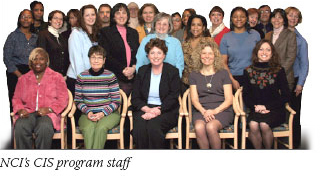
Guest Update by Dr. John E. Niederhuber
NCI's CIS Celebrates 30 Years
 In 1971, the National Cancer Act greatly broadened NCI's scope and responsibilities. In addition to conducting and supporting research and training the next generation of investigators, NCI was also tasked with providing patients and health professionals with comprehensive, accurate information on the most recent advances in cancer treatment and prevention.
In 1971, the National Cancer Act greatly broadened NCI's scope and responsibilities. In addition to conducting and supporting research and training the next generation of investigators, NCI was also tasked with providing patients and health professionals with comprehensive, accurate information on the most recent advances in cancer treatment and prevention.
This mandate led to the establishment of NCI's Cancer Information Service (CIS) in 1975. CIS provides education and information to cancer patients and the public, partners with organizations that reach minority and underserved communities, and collaborates on health communications research. Today, there are 15 regional CIS offices funded by NCI through competitively awarded contracts.
The early CIS comprised a mix of paid staff and volunteers, and each call center served only a specific geographic area. Over the following decade, efforts were made to establish the central, toll-free number used today, 1-800-4-CANCER, as well as to implement specialized services such as Spanish-language assistance and a smoking cessation quitline. Today, the voices answering these lines belong to highly trained cancer information specialists, who tailor information to meet each user's needs.
In addition to calling 1-800-4-CANCER, anyone with an Internet connection now can reach CIS through LiveHelp, an instant messaging service provided through NCI's Web site, Cancer.gov. However, the phone service continues to play a vital role. According to Dr. Thomas Fahey, principal investigator of the CIS contract at Memorial Sloan-Kettering Cancer Center, the public still sees the telephone service as very valuable, specifically to get cancer information that is not immediately available to them over the Web.
A vital component of the modern CIS is its Partnership Program, through which CIS reaches out to minority and other medically underserved populations. As explained by Mary Anne Bright, director of CIS, the regional CIS offices identify communities that suffer an unequal burden of cancer and lack access to services, and work with organizations trusted by these communities to try to address those gaps.
The CIS Partnership Program has worked extensively to increase the rates of breast and cervical cancer screening in underserved communities and also leads educational programs to increase the awareness of clinical trials in underrepresented populations. The regional CIS offices, with their firsthand knowledge of the needs of the regional populations and the long-term partnerships they have developed and nurtured, are vital to the success of the Partnership Program. And in turn, explains Dr. Jon Kerner, deputy director for Research Dissemination and Diffusion in NCI's Division of Cancer Control and Population Sciences, CIS has supplied critical support to its community partners during the formulation and implementation of state comprehensive cancer control plans.
Since the 1980s, CIS has also collaborated on research to advance health communications, and in 2003 launched an official research agenda focusing on four research priorities: testing innovative cancer communication and education interventions; increasing access to and promoting appropriate use of cancer-related information and education; discovering effective models for disseminating successful cancer communication and education interventions; and understanding information seeking - who needs, looks for, and obtains cancer-related information.
CIS begins its next 30 years of providing help nationally and internationally with the continuing support of the cancer community. As summed up by a member of that community, Dr. Paul Engstrom, principal investigator of the CIS contract at Fox Chase Cancer Center, CIS keeps reinventing itself as needs change, continuing to meet definite needs and provide services that are not available anywhere else.
|